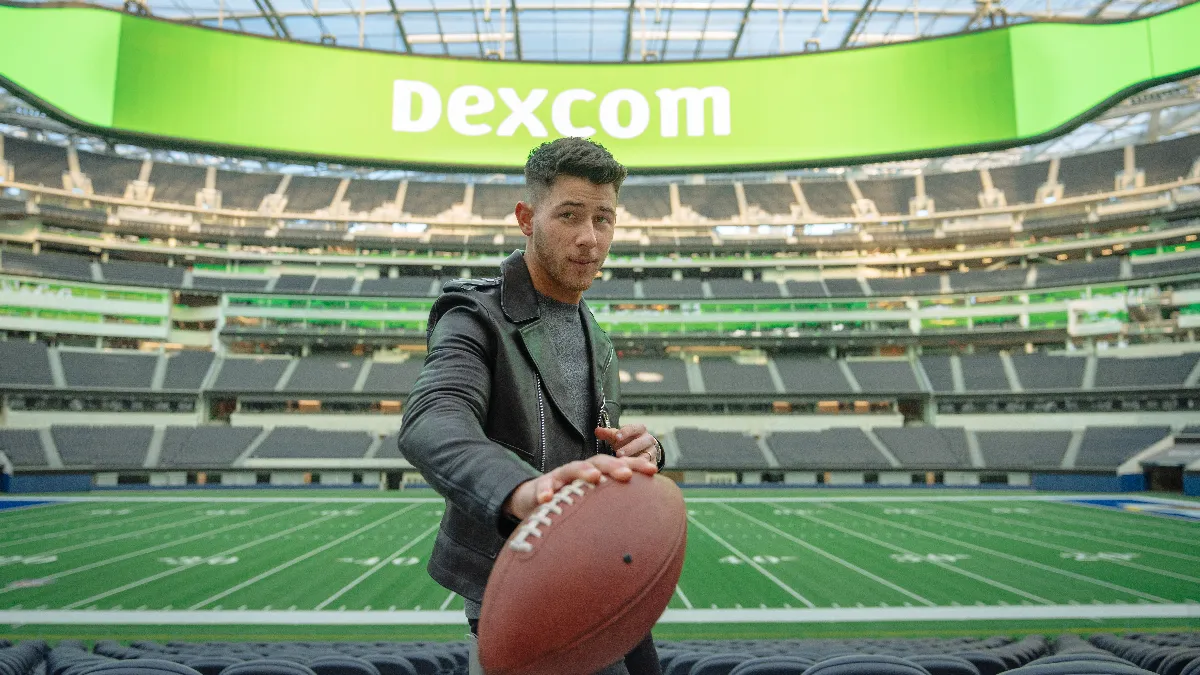Diabetes technology companies began 2022 much like they closed 2021 — by growing revenue over the prior year as the use of wearable diabetes management devices continues to take off.
Dexcom, Insulet and Tandem Diabetes Care reported double-digit revenue growth in the first quarter even as each company faced challenges from the omicron surge in January. That signals that the diabetes tech space continues to be one of the most pandemic-resilient submarkets in the medical device industry.
Dexcom, which makes continuous glucose monitors, grew revenue by 25% to $628.8 million in the quarter. While the company's sales declined 10% compared with the fourth quarter of 2021, Dexcom has reported a drop in first-quarter revenue versus the prior three-month period for the past four years.
While Dexcom’s business doesn't include any procedures, the company still faces pressure when COVID-19 cases increase.
On an April 28 earnings call, executives said that the omicron surge slowed new patient additions at the start of the year, although the pressure eased as the quarter progressed and the surge subsided.
“In December, we saw the impact of omicron, and that continued pretty heavily into January in terms of getting out there and getting in front of prescribers,” CFO Jereme Sylvain said on the call. “As the quarter progressed, each month got a little bit better as things really opened up … January was a bit tough, February was better and March was even better than that.”
CEO Kevin Sayer told investors that new customer additions ultimately met internal expectations despite the pressure at the beginning of the quarter.
Last quarter, the company’s G7 CGM system received a CE mark for Europe, an announcement that was expected in 2021 but delayed throughout the second half. The product was first launched in the U.K. and will be expanded further in the coming months.
The G7 is also under review with the Food and Drug Administration. After a CE mark was delayed last year, anticipation for the product in the U.S. has been building, with J.P. Morgan analysts writing in an April 28 note that G7 is likely the “the biggest new product launch” for the device industry this year.
Sayer said that the company doesn't expect a decision from the FDA until June.
SVB Securities analysts wrote in an April 28 report that they would not be surprised if challenges like labor and currency headwinds continue for the next several quarters, but added that Dexcom’s long-term revenue forecast of “$4.0B- $4.5B by 2025 will likely prove conservative.”
For reference, Dexcom grew revenue year over year by 27% to $2.45 billion in 2021.
“The supply chain is still a bit turbulent. It just really hasn't settled down. We hope it happens here in the next month or so — maybe in the second half of this year — but it's definitely still been a little problematic for the distributors.”

John Sheridan
CEO, Tandem Diabetes Care
Abbott Laboratories, Dexcom’s rival, also reported an increase in sales in the first quarter for its diabetes care unit. The medtech company said FreeStyle Libre CGM sales year over year climbed about 20% on a reported basis to approximately $1 billion.
The medtech company’s newest CGM, called FreeStyle Libre 3, is also in a limited launch in Europe. Abbott CEO Robert Ford said on an April 20 earnings call that the product will be released at a faster pace than FreeStyle Libre 2. However, the CEO did not give a specific timeline or discuss which markets will be next.
Ford also did not provide details regarding a U.S. clearance or launch for Libre 3.
Tandem vs. Insulet
Tandem and Insulet, which both make insulin pumps, also recorded similar quarters as the CGM companies.
Tandem CEO John Sheridan said on a May 4 earnings call that the company is still navigating COVID-19 and supply chain challenges in the U.S. and international markets. Still, the company grew sales year over year by 25% to $175.9 million last quarter.
The company is still meeting with healthcare providers in a mix of virtual and in-person interactions as the environment “varies wildly” depending on the practice or the region of the country, according to Sheridan.
Tandem CFO Leigh Vosseller said that the company was forced to deal with “heavy” staffing shortages last quarter, primarily due to a higher rate of staff being sick amid the COVID-19 surge in January, which affected getting new patients on insulin pumps.
“That's where our field is trying to help supplement as much as possible as they work with their physician customers to make sure we can still get new patients onto the product as expected," Vosseller said. “I think we've been very successful, again, not without challenge, but the team has worked very hard.”
Shipments of Tandem’s insulin pumps increased by 11% year over year to 28,095 devices. Still, shipping growth in the first quarter slowed compared to each quarter last year.
Tandem's insulin pump shipment growth has slowed the last three quarters
| Q1 2021 | Q2 2021 | Q3 2021 | Q4 2021 | Q1 2022 | |
|---|---|---|---|---|---|
| Total shipments (YoY growth) |
25,352 (46%) |
33,817 (81%) |
31,558 (43%) |
37,585 (15%) |
28,095 (11%) |
SOURCE: Tandem Diabetes Care's earnings reports
Tandem CEO Sheridan also reported pressures on international shipping last quarter and noted it may take more time to return to normal.
“The supply chain is still a bit turbulent. It just really hasn't settled down,” Sheridan said. “We hope it happens here in the next month or so — maybe in the second half of this year — but it's definitely still been a little problematic for the distributors.”
Tandem also will soon face stiffer competition in the market as Insulet expands its launch of the Omnipod 5 pump. The product received FDA clearance in January and is being rolled out in stages over 2022.
SVB Securities analysts wrote that Tandem continues to “prove us wrong as it relates to the company’s ability to sustain strong double-digit growth despite competitive dynamics,” but they still questioned the company’s future.
“With Omnipod 5’s limited market release underway, we continue to worry that we have less visibility into and lower conviction in sales upside in the medium-term (2023+) as the competitive environment gets tougher,” the analysts wrote in a May 4 note.
Rival Insulet grew revenue year over year by 17% to $295.4 million last quarter. After also facing omicron pressure at the beginning of the year, the company forecasts a revenue growth range of 12% to 15% in the second quarter over the year-earlier period.
Regarding the Omnipod 5 launch, CEO Shacey Petrovic said on a May 5 earnings call that the company is now transitioning from hundreds of patients having the device to thousands, with Insult moving closer to a full launch.
Petrovic, who also announced that she will be leaving the company at the end of the month, said the product is not yet available in the retail or pharmacy channel, where about 80% of its business goes through.
Petrovic said in an interview in March that the limited launch will take between three and nine months depending on how each stage goes. The CEO didn't provide a more specific timeline on the most recent earnings call.
Tandem’s Sheridan said that the “new product” in the U.S. — the CEO did not name it specifically — hasn't altered the competitive landscape so far. He added that the company has “heard conversations about it, but there are so few systems that are out there that it’s really very difficult for us to get a sense for how it's actually performing”
William Blair analysts wrote in a May 5 note that demand from Omnipod 5 is going to grow in the second quarter as Insulet transitions to the next stage of the launch.
“In our view, while Insulet is not calling this a full market release, we expect the ramping of Omnipod 5 [direct to consumer] spend and opening of prescriptions to all physicians should start to drive notable incremental demand through the second quarter, which is likely not meaningfully baked into guidance and could help deliver upside,” the analysts wrote.
Insulet forecasts a revenue growth range of 12% to 16% for 2022. In 2021, the company reported full-year sales of $1.1 billion.
Medtronic, which makes CGMs and insulin pumps, hasn't yet reported sales figures for the quarter. The company's diabetes business has experienced a series of setbacks recently, including an FDA warning letter due to product safety issues and losing market share.
The medtech company will report earnings on May 26 at 8 a.m. ET.

















